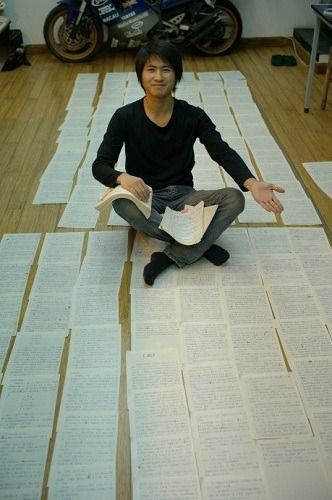At the beginning of 2012,China detonated its first social topic; Best-selling China author Han Han is suing anti-fraud crusader Fang Zhouzi, who recently accused Han of hiring ghostwriters for most of his works.
The lawsuit follows Fang’s claims that the author of The Three Doors – Han’s first published book, by which he gained national prominence – might have been someone else. Fang implied that the ghostwriter could have been Han’s father.
The quarrel was started by Mai, an IT commentator on early January, who published an article on his blog, which claimed that the image of Han Han as a public intellectual was created by his father Han Renjun and publisher Lu Jinbo.
Mai claimed Han, a professional rally driver, wrote many of his books and blogs during periods when he was taking part in driving events.
Han, who is one of China’s most popular bloggers, responded in an online article saying he would pay 20 million Yuan to anyone who had evidence to show he had hired other writers to finish his work.
Mai mentioned that Han Han once forgot the meaning of the title of his debut work Three Gates in an interview, while his father explained it well and remembered it clearly 10 years after it had been written.
Jan 18th, Fang Zhouzi, who is known for his campaigns against pseudoscience and various frauds in China., backed up Mai’s suspicions.
He said when he wanted to read an article published by Han Han on his blog in April 2007, he found that all the articles he had written from December 2006 to September 2007 had been deleted.
He said he and his father were from two different generations and it was impossible for them to have the same writing style.
Han’s publisher said Han had collected more than 1,000 pages of his novels’ original manuscripts and would hand them to authorities for identification to prove that he worked on the novels on his own.
In his blog, Han wrote: “A writer’s hardships in the past dozen years might just be ruined by a rumor and the performances of several men.”
Han and his lawyer were preparing for the lawsuit and a decision on whether the court would accept the case would be announced soon.
Fang wrote on his blog: “It’s Han’s right to sue me and it can attract more people to pay attention to the incident and learn the truth behind it. It’s not a bad thing. I analyzed and doubted Han and his articles are not violations to his reputation, while Han damaged mine by insulting me and my family online.”
Han han, who failed his college entrance exam, rose to fame in a high-school writing competition inShanghaiin 1999. His rebellious streak and satirical writing proved popular with the younger generation.
Widely known as a crusader against academic fraud, Fang Zhouzi was once assaulted by thugs in Beijing in August 2010.
The lawsuit follows Fang’s claims that the author of The Three Doors – Han’s first published book, by which he gained national prominence – might have been someone else. Fang implied that the ghostwriter could have been Han’s father.
The quarrel was started by Mai, an IT commentator on early January, who published an article on his blog, which claimed that the image of Han Han as a public intellectual was created by his father Han Renjun and publisher Lu Jinbo.
Mai claimed Han, a professional rally driver, wrote many of his books and blogs during periods when he was taking part in driving events.
Han, who is one of China’s most popular bloggers, responded in an online article saying he would pay 20 million Yuan to anyone who had evidence to show he had hired other writers to finish his work.
Mai mentioned that Han Han once forgot the meaning of the title of his debut work Three Gates in an interview, while his father explained it well and remembered it clearly 10 years after it had been written.
Jan 18th, Fang Zhouzi, who is known for his campaigns against pseudoscience and various frauds in China., backed up Mai’s suspicions.
He said when he wanted to read an article published by Han Han on his blog in April 2007, he found that all the articles he had written from December 2006 to September 2007 had been deleted.
He said he and his father were from two different generations and it was impossible for them to have the same writing style.
Han’s publisher said Han had collected more than 1,000 pages of his novels’ original manuscripts and would hand them to authorities for identification to prove that he worked on the novels on his own.
In his blog, Han wrote: “A writer’s hardships in the past dozen years might just be ruined by a rumor and the performances of several men.”
Han and his lawyer were preparing for the lawsuit and a decision on whether the court would accept the case would be announced soon.
Fang wrote on his blog: “It’s Han’s right to sue me and it can attract more people to pay attention to the incident and learn the truth behind it. It’s not a bad thing. I analyzed and doubted Han and his articles are not violations to his reputation, while Han damaged mine by insulting me and my family online.”
Han han, who failed his college entrance exam, rose to fame in a high-school writing competition inShanghaiin 1999. His rebellious streak and satirical writing proved popular with the younger generation.
Widely known as a crusader against academic fraud, Fang Zhouzi was once assaulted by thugs in Beijing in August 2010.
















